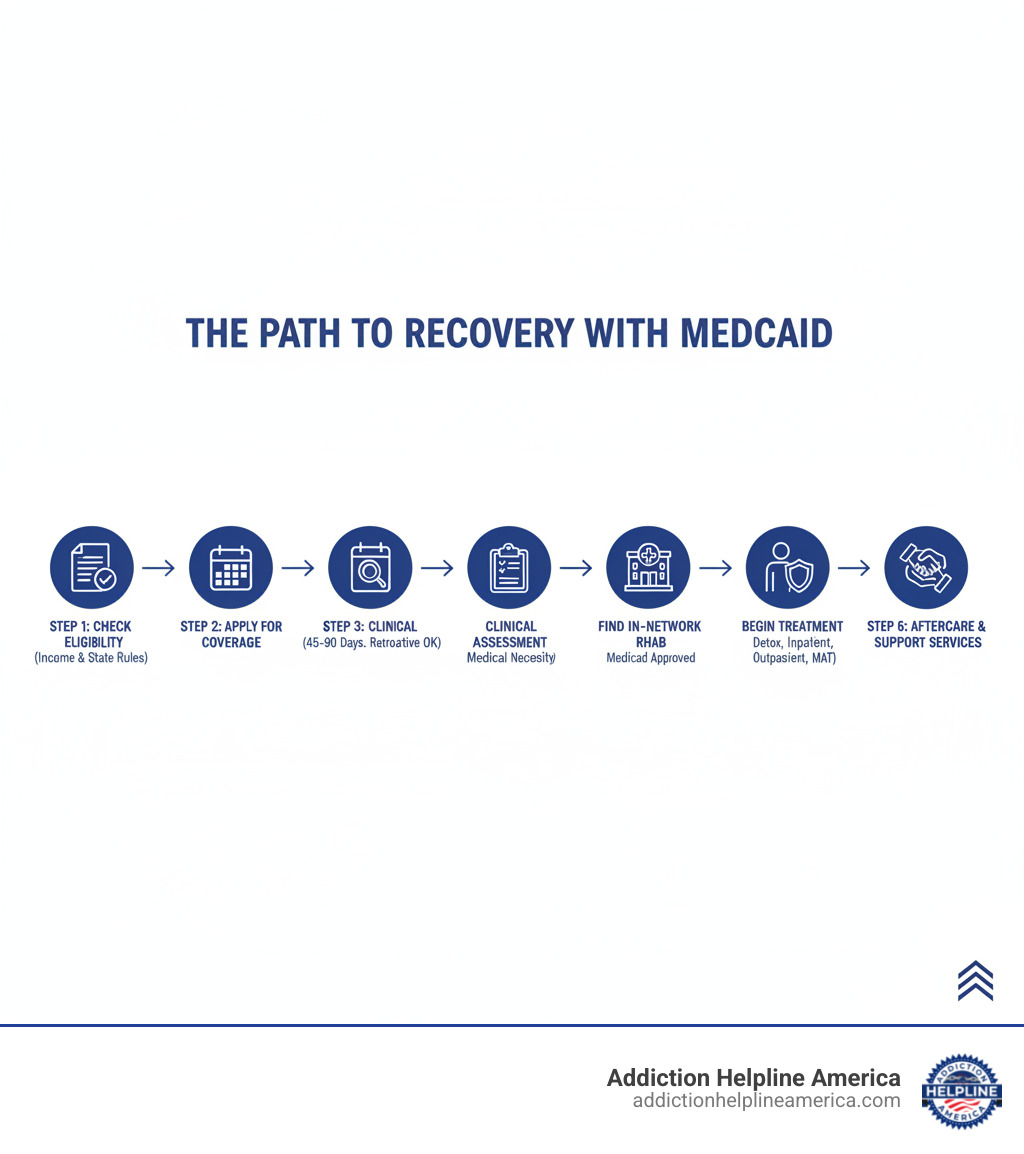
Why Access to Treatment Through Medicaid Matters
Medicaid rehab centers provide essential addiction treatment for millions of Americans who might otherwise be unable to afford it. If you’re seeking help, here’s what you need to know:
Quick Answer: What Are Medicaid Rehab Centers?
- Coverage: Medicaid covers a full range of services, including detox, inpatient/residential care, outpatient programs, medication-assisted treatment (MAT), and counseling.
- Eligibility: It’s available to low-income individuals, families, pregnant women, and people with disabilities.
- Cost: Most states offer addiction treatment with no or very low copays.
- Availability: The majority of treatment facilities in the U.S. accept Medicaid.
- Finding Care: Use resources like FindTreatment.gov or contact your state’s Medicaid office to find approved facilities.
The cost of addiction treatment shouldn’t be a barrier to recovery. With over 71 million Americans enrolled, Medicaid is the largest payer of behavioral health services in the country. Critically, nearly 12% of adult Medicaid recipients have a substance use disorder.
Thanks to the Affordable Care Act and the Mental Health Parity and Addiction Equity Act, Medicaid must cover addiction treatment just like any other medical condition. This makes comprehensive care—from detox to therapy—accessible to those who qualify.
This guide explains what Medicaid covers, how to find high-quality rehabs that accept it, and what to look for in a treatment program. At Addiction Helpline America, we specialize in helping people steer their coverage options to find effective medicaid rehab centers. We’re here to provide the guidance you need to take the first step toward recovery.
Understanding Medicaid Coverage for Addiction Treatment
Medicaid is a joint federal and state program providing health coverage to millions of low-income Americans. It has become a vital lifeline for people seeking help with substance use and mental health conditions. Because each state manages its own program, specific benefits and eligibility rules can vary, though core services remain consistent.
| Medicaid | Medicare | |
|---|---|---|
| Who It Covers | Low-income individuals and families, pregnant women, people with disabilities (any age) | People 65+, younger people with certain disabilities, those with End-Stage Renal Disease |
| Addiction Treatment Coverage | Comprehensive coverage including detox, inpatient, outpatient, MAT, and counseling | Covers addiction treatment but with different cost-sharing requirements |
| State Variation | Significant variation by state in eligibility and specific benefits | Federally standardized across all states |
| Cost to Patient | Often no copays or minimal costs for addiction treatment | May have deductibles, copayments, and coinsurance |
People often confuse Medicaid with Medicare. While both are government programs, Medicare is primarily for those 65 or older and younger people with certain disabilities. Medicaid is based on income and serves low-income individuals and families of any age. Some people, known as “dual-eligible,” qualify for both.
Two landmark laws transformed addiction treatment coverage under Medicaid. The Affordable Care Act (ACA) required insurance plans, including Medicaid, to cover mental health and substance use disorder services as essential health benefits. The Mental Health Parity and Addiction Equity Act (MHPAEA) ensures that cost-sharing and treatment limits for addiction care cannot be more restrictive than those for physical health conditions. Together, these laws cemented Medicaid’s role as the largest single payer for behavioral health services in the U.S. You can learn more about how Medicaid is Key to Comprehensive Care on our site.
What Types of Treatment Does Medicaid Cover?
Medicaid covers a full continuum of care to meet people at different stages of their recovery journey. Coverage generally includes:
- Screenings and Intervention Services: To identify substance use issues early.
- Medical Detox: Medically supervised withdrawal to safely manage acute physical symptoms.
- Inpatient or Residential Care: 24/7 structured support in a residential setting, offering intensive therapy and medical supervision away from daily triggers.
- Outpatient Programs: Flexible treatment that allows you to live at home. This includes more intensive Partial Hospitalization Programs (PHP) and Intensive Outpatient Programs (IOP).
- Medication-Assisted Treatment (MAT): Combines FDA-approved medications with counseling, a highly effective approach for opioid and alcohol use disorders.
- Counseling and Therapy: Individual, group, and family therapy to address personal issues, build peer support, and heal relationships.
- Co-occurring Mental Health Services: Treatment for conditions like depression, anxiety, or PTSD that often accompany addiction.
For a deeper dive into these treatment types, visit our guide on Types of Treatment Programs.
Are Addiction Medications Covered?
Yes, Medicaid is required to cover medications for addiction treatment, particularly for opioid use disorder (OUD). This is a critical component of modern, evidence-based care.
Medicaid typically covers all three FDA-approved medications for OUD:
- Methadone: Dispensed at certified opioid treatment programs (OTPs).
- Buprenorphine: Often prescribed in an outpatient setting (e.g., Suboxone).
- Naltrexone: An oral or injectable (Vivitrol) medication that blocks the effects of opioids and can reduce alcohol cravings.
While specific rules like prior authorization may vary by state, federal law mandates access to these life-saving medications. MAT is not “replacing one drug with another”; it is an evidence-based treatment that normalizes brain chemistry, relieves cravings, and significantly improves recovery outcomes. We help individuals find medicaid rehab centers that offer these crucial services. Learn more from our resources on Medicaid Coverage for MAT.
How to Find and Use Medicaid Rehab Centers
Finding addiction treatment through Medicaid is manageable once you understand the steps. Eligibility and access are key to getting the care you or a loved one needs.
Medicaid eligibility is primarily based on income relative to the Federal Poverty Level (FPL), though age, pregnancy, and disability status are also factors. Because requirements vary significantly by state, check your state’s Medicaid program for current guidelines. The application process can take 45 to 90 days, but many states offer retroactive coverage for up to three months prior to your application date, which can be a huge relief if you need to start treatment immediately.
The Process for Using Medicaid for Rehab
Using your benefits for addiction treatment follows a clear path:
- Confirm Eligibility: Before starting, double-check that your Medicaid coverage is active, especially if your income or household situation has changed.
- Get a Clinical Assessment: A healthcare professional must evaluate you to determine “medical necessity.” This assessment identifies the appropriate level of care (e.g., detox, inpatient, outpatient) that Medicaid will cover.
- Find In-Network Providers: This is crucial: Medicaid generally does not cover out-of-network rehabs. You must find a facility that is part of your state’s Medicaid network. The good news is that a majority of U.S. treatment facilities accept Medicaid.
- Handle Pre-Authorization: Some services, especially inpatient care, may require prior approval from your Medicaid plan. The rehab center’s admissions team can help you with this paperwork.
Our resources on Choosing the Right Rehab Facility can help you make an informed decision.
Finding High-Quality Medicaid Rehab Centers
Finding a facility that accepts Medicaid and provides high-quality care is the goal. Here are the best ways to locate one:
- Addiction Helpline America: Our helpline is designed to connect you with suitable medicaid rehab centers in your state. We can verify your coverage and find programs that match your specific needs.
- FindTreatment.gov: This confidential online directory from the Substance Abuse and Mental Health Services Administration (SAMHSA) lets you search for facilities by location, services, and payment options, including Medicaid.
- Your State Medicaid Office: Your state’s agency provides lists of approved providers and managed care organizations. You can find your local office through the official State Medical Assistance (Medicaid) office portal.
Once you have a list, contact the centers directly. Ask about their programs, experience with Medicaid, and admissions process. Always verify that a facility is in your network to avoid unexpected costs. We know this process can be overwhelming, and we’re here to help you find the right fit.
What Defines the “Best” Medicaid Rehab Centers: 7 Factors to Compare
When searching for treatment through Medicaid, you deserve the best care available. But what makes a Medicaid rehab center truly excellent? It’s more than just accepting your insurance. The best facilities combine evidence-based practices with compassionate care, addressing every aspect of recovery.
Based on our experience connecting people with treatment, we’ve identified seven critical factors that separate good programs from great ones. These are the building blocks of effective, lasting recovery. Use them to compare facilities and make an informed decision for yourself or a loved one.
1. National Accreditation (CARF or The Joint Commission)
One of the first signs of a quality medicaid rehab center is national accreditation. This is a seal of approval indicating the facility meets high standards for patient care, safety, and treatment outcomes.
The two main accrediting bodies are:
- CARF (Commission on Accreditation of Rehabilitation Facilities)
- The Joint Commission
When a facility earns accreditation from one of these respected organizations, it shows a commitment to quality for all patients, regardless of their insurance. These accrediting bodies hold centers accountable through rigorous reviews of their policies and procedures. Asking about accreditation is a simple way to identify a top-tier facility.
2. A Full Continuum of Care
Recovery is a journey with different stages, each requiring a different level of support. The best medicaid rehab centers offer a full continuum of care, guiding you through every phase of recovery.
This seamless approach means a single treatment system can provide:
- Medical Detox to manage withdrawal safely.
- Inpatient or Residential Treatment for 24/7 structured support.
- Outpatient Step-Down Programs like PHP and IOP to transition back to daily life.
- Aftercare Planning for relapse prevention and long-term support.
When a facility offers or coordinates these levels of care, you receive consistent support from professionals who know your story. This continuity is vital for building a strong foundation for lasting recovery.
3. Specialized Dual Diagnosis Programs
About half of all people with a substance use disorder also have a co-occurring mental health condition like depression, anxiety, or PTSD. This is known as a dual diagnosis. These conditions often fuel each other, making it essential to treat them simultaneously.
The best medicaid rehab centers offer integrated dual diagnosis programs that address both substance use and mental health together. This approach leads to significantly better recovery outcomes because it treats the underlying issues that may contribute to addiction.
When evaluating facilities, ask if they have staff trained in dual diagnosis and offer integrated treatment. For many, this is essential for successful, long-term recovery. Find more at our Dual Diagnosis Resources.
4. Evidence-Based Medication-Assisted Treatment (MAT)
For opioid and alcohol use disorders, medication-assisted treatment (MAT) is the gold standard of care. This evidence-based approach combines FDA-approved medications with counseling and behavioral therapies to address both the physical and psychological aspects of addiction.
MAT is proven to reduce relapse and overdose risk, manage cravings, and help people stay in treatment longer. The medications give your brain the support it needs to heal while you develop new coping skills in therapy.
Top medicaid rehab centers integrate MAT as a core part of their treatment offerings. When evaluating a facility, ask if they provide MAT and combine it with comprehensive counseling. This integrated approach is a hallmark of high-quality, science-backed care.
5. Individualized Treatment Planning
Everyone’s path to addiction is unique, which is why a one-size-fits-all approach to treatment rarely works. The best medicaid rehab centers recognize this and develop individualized treatment plans custom to your specific needs, history, and goals.
This process starts with a comprehensive assessment that looks at your substance use, mental health, trauma history, and personal strengths. Based on this, a customized plan is created, incorporating therapies that are right for you, such as:
- Cognitive-Behavioral Therapy (CBT)
- Dialectical Behavior Therapy (DBT)
- Trauma-Informed Care
- Family Therapy
Your plan should be flexible and evolve as you progress in your recovery. A personalized approach that addresses the root causes of addiction is far more likely to lead to lasting success.
6. Specialized Programs for Diverse Populations
Effective recovery programs acknowledge that different groups face unique challenges. The best medicaid rehab centers offer specialized tracks to create a safe and supportive environment for everyone.
Look for programs such as:
- Gender-Specific Programs: Men and women often have different experiences with addiction and recovery. These programs create a space to address issues like trauma or emotional expression in a comfortable setting.
- LGBTQ+-Affirming Care: An inclusive environment free from judgment is critical for LGBTQ+ individuals, who may have experienced discrimination or trauma related to their identity.
- Veterans Programs: These programs understand military culture and address challenges specific to veterans, such as combat trauma, PTSD, and reintegration into civilian life.
- Programs for Pregnant and Postpartum Women: These provide integrated medical care for both mother and baby, parenting support, and a judgment-free space to get healthy.
Finding a program where you feel understood is key. We can help connect you with medicaid rehab centers that offer the specialized care you need.
7. Robust Aftercare and Alumni Support
Recovery is a lifelong process that extends far beyond completing a formal treatment program. What happens after rehab is often what determines long-term success. The best medicaid rehab centers make aftercare a central part of their services.
A strong aftercare plan provides a safety net as you transition back to daily life. Key components include:
- Relapse Prevention Planning: Working with counselors to identify triggers, develop coping strategies, and create an action plan for challenging moments.
- Connection to Community Resources: Referrals to support groups like AA/NA, outpatient therapists, and sober living arrangements to build a strong support system. Our guide on Long Term Rehab Centers offers more on this.
- Alumni Programs: Ongoing support through check-in groups, social events, and mentorship from a community of peers who understand the recovery journey.
When evaluating a facility, ask detailed questions about their aftercare offerings. A center committed to your long-term success will have a comprehensive plan.
Frequently Asked Questions about Medicaid for Rehab
Navigating Medicaid for addiction treatment can bring up many questions. Here are answers to some of the most common ones we hear.
How long of a rehab stay will Medicaid cover?
The length of stay covered by Medicaid depends on medical necessity, not a fixed number of days. A clinical assessment will determine the level and duration of care you need. While some plans may have guidelines for inpatient stays (e.g., 30, 60, or 90 days), coverage can be extended if your treatment team documents a continued need. Outpatient programs often have more flexibility and can last for several months or longer. Always confirm coverage details with your Medicaid plan and the medicaid rehab center. Understanding the principles of effective treatment duration can also be helpful.
Does Medicaid cover out-of-state rehab centers?
Generally, no. Medicaid is a state-specific program, so your plan in one state will not typically cover treatment in another. Exceptions for out-of-state care are rare and require special prior authorization for services that are medically necessary but unavailable in your home state. For most people, it is essential to find an in-state, in-network medicaid rehab center. Our helpline specializes in connecting you with quality, approved programs in your area.
Are there any copayments for addiction treatment with Medicaid?
This is one of the biggest benefits of Medicaid: in most states, there are no copayments for addiction treatment services. Once your treatment is approved as medically necessary, your out-of-pocket costs are often zero or very low. Some states may have minimal, capped copays, but they are designed to be affordable. The goal of Medicaid is to remove financial barriers to care. It’s always a good idea to confirm any potential costs with your state’s Medicaid office and the facility’s admissions team.
Conclusion
Recovery from addiction is possible, and financial barriers shouldn’t stand in the way. Medicaid is a vital lifeline that makes comprehensive addiction treatment accessible and affordable for millions of Americans who qualify.
As this guide has shown, Medicaid covers a full range of services, from medical detox and inpatient care to outpatient programs and MAT. By understanding how to find an in-network provider and what to look for in a quality program—like accreditation, individualized planning, and robust aftercare—you can confidently take the next step.
The best medicaid rehab centers offer the evidence-based, compassionate care you deserve. At Addiction Helpline America, we are dedicated to helping you find the right path forward. Our guidance is free, confidential, and personalized to your unique needs.
Hope and healing are within reach. Call our 24/7 helpline for personalized assistance and start your journey toward a brighter future.
Our helpline is 100%
free & confidential
If you or someone you care about is struggling with drug or alcohol addiction, we can help you explore your recovery options. Don’t face this challenge alone—seek support from us.
Programs
Resources
Will my insurance
cover addiction
treatment?
We're ready to help
Find the best
drug or alcohol treatment
center
Are you or a loved one struggling with addiction? Call today to speak to a treatment expert.







